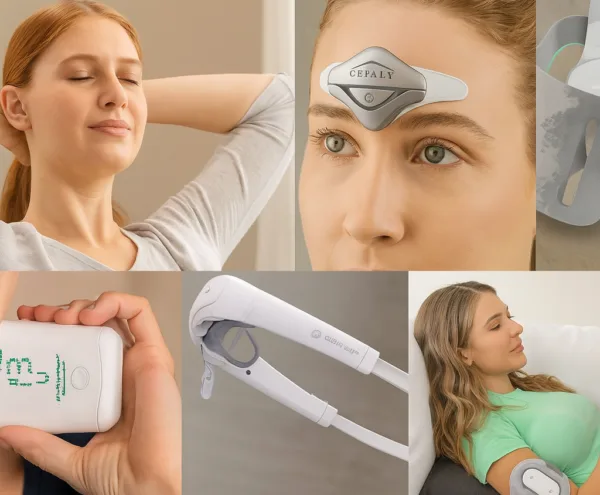Chronic migraines are a debilitating type of headache disorder. It is estimated that migraine occurs in 3 of 20 adults and 3 in every 4 sufferers are female. According to Statistics Canada, around 2.7 million of Canadians suffer from migraine headaches.
Chronic migraine sufferers have at least 15 days of headaches per month, with at least 8 of those days being migraine. Chronic migraines can seriously interfere with the migraine sufferer’s quality of life. Often, chronic migraine sufferers also experience depression, anxiety, and sleep disturbances.
What causes chronic migraines?
It is currently thought that migraines occur due to both environmental and genetic factors. So far, research studies have identified a number of genetic factors, which can contribute to the development of migraines. A big contributing factor to developing chronic migraines is medication overuse. Taking over-the-counter and prescription drugs more than 2-3 days per week can cause overuse headaches.
What is botulinum toxin?
Botulinum toxin (commonly known as BOTOX®) is a protein produced by the bacterium Clostridium botulinum and species related to it. Botulism toxin is neurotoxic, which means that in its pure form, it blocks nerve function and causes paralysis.
Eight different subtypes of botulinum toxin (A-H) are known currently. The type of botulinum toxin used to treat chronic migraines is a highly dilute preparation of botulinum toxin type A.
How does botulinum toxin work?
Botulinum toxin works by blocking nerve cells from releasing a chemical messenger called acetylcholine, which prevents muscles from contracting and causes paralysis.Botulinum toxin is also used to create muscle-relaxing medications such as Botox, the drug used to smooth out facial wrinkles.
What is botulinum toxin used for?
While botulinum toxin is well-known for its use in cosmetic procedures, there are some conditions that are treated very effectively by botulinum toxin, including a condition in which the neck muscles are too contracted (cervical dystonia), migraine headaches, and uncontrollable blinking (blepharospasm).
It is often used to treat conditions which involve muscle spasticity, including post-stroke spasticity, and post-spinal cord injury spasticity. Interestingly, botulism toxin can also be used to treat excessive sweating.
Can botulinum toxin help reduce chronic migraines?
According to recent scientific studies, there is increasing evidence that botulinum toxin injections can help to decrease the frequency of chronic migraine attacks. A recent study published in the scientific journal Plastic and Reconstructive Surgery shows that botulinum toxin is effective for preventive treatment of migraines. The study analyzed data from 17 previous clinical trials comparing botulinum toxin with placebo for preventive treatment of migraine headaches.
This study involved nearly 3,650 patients, about 1,550 of whom had chronic migraines. The results show that botulinum toxin injections significantly reduced the frequency of chronic migraine attacks compared to placebo injections.
Three months after injection, patients treated with botulinum toxin had an average of 1.6 fewer migraine attacks per month. There was also significant improvement in quality of life in patients treated with botulinum toxin, which was directly linked to reduced depressive symptoms
The improvement was apparent within two months of botulinum toxin treatment. To sustain the effects of treatment, botulinum toxin injections are typically repeated every three months. Therefore, the results of this study show effectiveness of botulinum toxin injections when used as preventive treatment for chronic migraines.
How are botulinum toxin injections administered?
Botox was approved by Health Canada for treatment of chronic migraines in 2012. Since then, many patients have reported positive results and reduced number of migraines. A botulinum toxin injection is typically a relatively quick and simple procedure that can be done in a doctor’s office. Usually, no preparation is needed before you go to have an injection. First, the area for injection is prepared and cleaned.
The patient may feel some pain or pressure associated with the injection related to the needle and fluid itself. However, a local anaesthetic agent is usually not needed. In fact, the botulinum toxin injection is just like getting a vaccination shot, with a smaller amount of liquid being injected into the treatment area. The effects typically last for 3-4 months, and the injection is usually repeated.
Does a botulinum toxin injection cause any side effects?
Botulinum toxin injection is a relatively safe procedure and has very few serious side-effects. The local side effects of botulinum toxin injections vary depending on the area of the body injected. General side-effects can include pain around the injection site, a rash, itchiness, headache and tiredness.
There also may be flu-like symptoms, but they are usually short-lived. After receiving botulinum toxin injection for headaches, most individuals will find it difficult to raise their eyebrows or wrinkle their forehead. This effect will also last for several months.
How does botulinum toxin prevent migraines?
It is still not known exactly how botulism toxin prevents migraines. More research is needed to identify the mechanism of its action in preventing headaches and treating other medical conditions. It is currently thought that it blocks pain signals in the nerves of the head and the neck. Moreover, scientists theorize that its effect on migraines does not depend on its muscle relaxation effect.
Who can use botulinum toxin for migraine prevention?
Only patients with chronic migraine are eligible for migraine treatment with botulinum toxin injections. Chronic migraine is defined as headaches occurring on at least 15 days each month, with at least half of the headaches being migraines. Botulinum toxin has not been shown to be effective in treatment of any other headache type (e.g., episodic migraine, tension-type headache).
Conclusion
Chronic migraines are a recurrent and debilitating headache disorder. According to the results of several scientific studies, botulinum toxin injection can be an effective method to reduce the frequency of chronic migraines. This treatment method is considered to be relatively safe, quick and simple, with few known side effects.


















